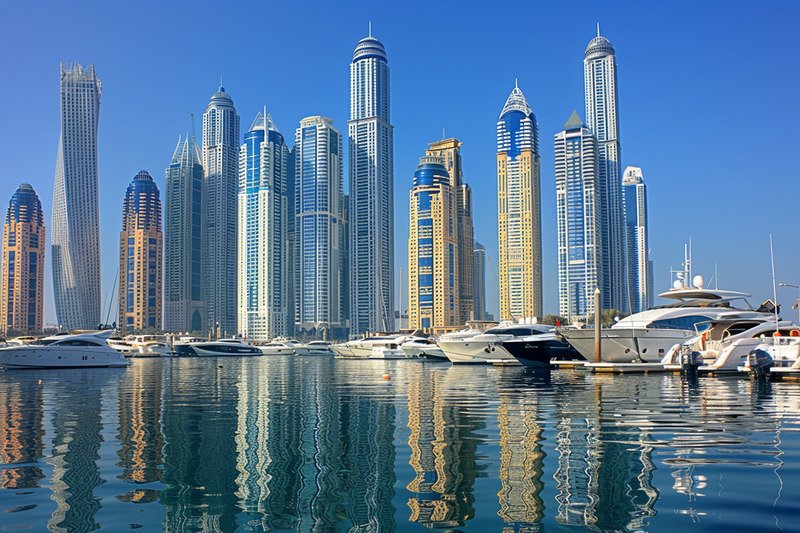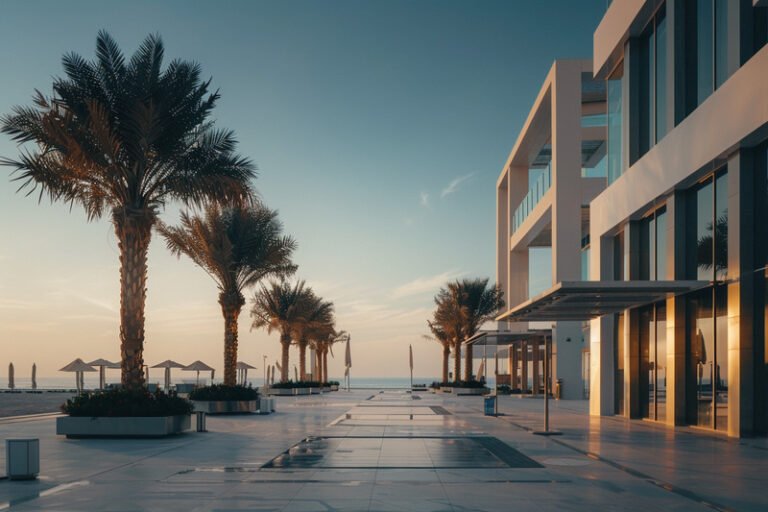Comparing Interest Rates Across Different Banks

Comparing Property Prices Across Different Areas in Dubai
When you're in the market for real estate in Dubai, comparing property prices across different areas can feel overwhelming. You'll need to consider various factors beyond just the advertised price, such as location, amenities, and potential for appreciation.
While popular areas like Dubai Marina often command higher prices, emerging neighborhoods may offer better value for money.
As you navigate Dubai's dynamic real estate landscape, it's crucial to understand how even minor differences in property prices can significantly impact your investment. The city's diverse offerings, from luxurious beachfront apartments to spacious villas in gated communities, cater to various preferences and budgets.
Let us help you find the perfect property. Contact us to get started.
Dubai's real estate market is known for its rapid development and constant evolution. New projects and infrastructure improvements can quickly change the desirability of an area, affecting property values.
Consider factors like proximity to public transportation, schools, and healthcare facilities when comparing properties. These amenities can greatly influence both the current price and future appreciation potential.
Don't forget to research upcoming developments in the areas you're interested in. Large-scale projects, such as new shopping malls or entertainment districts, can significantly boost property values in surrounding neighborhoods.
Key Takeaways
Comparing interest rates across different banks is crucial when investing in Dubai's real estate market. With numerous local and international financial institutions operating in the emirate, investors have a wide range of options to choose from. Understanding the nuances of interest rates, loan terms, and associated fees can significantly impact the overall cost of property acquisition and long-term investment returns. This guide provides key steps to help you navigate the process of comparing interest rates for real estate financing in Dubai.
Research multiple banks operating in Dubai, including local institutions like Emirates NBD and Mashreq, as well as international banks with a presence in the UAE. Gather comprehensive information on their real estate financing options and current interest rates.
Create a spreadsheet to organize data on interest rates, loan terms, and fees offered by each bank. Include details specific to Dubai's real estate market, such as loan-to-value ratios for different property types and any restrictions on foreign ownership financing.
Consider both fixed and variable interest rates available for Dubai properties. Pay attention to how these rates may change based on factors like property location, type (residential or commercial), and your residency status.
Calculate the Annual Percentage Rate (APR) for each loan option to get a true cost comparison. Include any additional fees specific to Dubai real estate transactions, such as mortgage registration fees with the Dubai Land Department.
Compare rates offered by online banks operating in Dubai with those of traditional banks. Consider the trade-offs between competitive rates and the personalized service that may be beneficial when navigating Dubai's unique real estate landscape.
Understanding Interest Rate Basics
Understanding Interest Rates in Dubai Real Estate
In Dubai's dynamic real estate market, grasping interest rate basics is crucial for investors and homebuyers. Interest rates represent the cost of borrowing for property purchases or the return on real estate investments. Typically expressed as a percentage, these rates can be fixed or variable. Dubai banks use interest rates to generate income on mortgages and attract property investors.
Several factors influence Dubai's real estate interest rates, including global economic conditions, local market trends, and UAE Central Bank policies. You'll encounter different types of interest rates, such as annual percentage rate (APR) for mortgages and rental yield for investment properties.
It's essential to understand the difference between simple and compound interest, as the latter can significantly impact your property investment returns over time. When comparing rates, consider the frequency of compounding and any fees or terms specific to Dubai's real estate market.
Be aware of Islamic finance options, which offer Sharia-compliant alternatives to traditional interest-based mortgages. These products often use different terminology and structures but serve similar purposes in Dubai's property market.
Types of Bank Accounts
When investing in Dubai real estate, understanding different property types is crucial for effective portfolio management. The most common options include apartments, villas, townhouses, and commercial properties.
Apartments are popular for their affordability and urban lifestyle. They range from studio units to luxurious penthouses, often featuring amenities like gyms and pools.
Villas offer more space and privacy, ideal for families. They come in various styles, from traditional Arabic to ultra-modern designs.
Townhouses provide a middle ground between apartments and villas. They offer more space than apartments but are generally more affordable than standalone villas.
Commercial properties include office spaces, retail units, and warehouses, catering to business needs.
Each property type serves different investment goals. Apartments may offer higher rental yields, while villas could provide better long-term appreciation. Commercial properties can offer stable income streams but may require more management.
Factors Affecting Interest Rates
Several key factors influence interest rates in Dubai's real estate market, shaping the landscape for property investors and homebuyers. The most significant factor is the Emirates Interbank Offered Rate (EIBOR), which serves as a benchmark for mortgage rates. When EIBOR rises or falls, you'll often see banks adjusting their rates accordingly.
Economic conditions in Dubai and the UAE play a pivotal role. During periods of economic growth, banks may offer higher interest rates to attract deposits and fund mortgages. Conversely, in times of economic downturn, rates tend to decrease.
The global oil price is another important factor, as it significantly impacts the UAE's economy and, consequently, its real estate market. Banks aim to maintain positive real interest rates after accounting for oil-driven economic fluctuations.
The bank's own financial health and business strategy can impact the rates they offer. Banks with strong balance sheets may provide more competitive rates, while those seeking to grow their mortgage portfolio might offer lower rates to attract new borrowers.
The type of property and loan product you're considering will affect the interest rate. Generally, mortgages for completed properties or those with longer repayment periods tend to offer better rates.
Online Vs. Traditional Banks
In Dubai's real estate market, the choice between online and traditional banks can significantly impact your financial outcomes. Online banks often provide more competitive interest rates due to lower operational costs, as they don't maintain physical branches. This translates to higher rates on savings accounts and lower rates on loans for real estate transactions.
Traditional banks in Dubai typically offer lower savings rates and higher loan rates but provide face-to-face interactions and personalized service. This can be invaluable for complex real estate deals or mortgage applications, offering in-person consultations and guidance.
Online banks may have stricter eligibility criteria, requiring higher credit scores or larger down payments for mortgages. Traditional banks might be more flexible, especially for existing customers.
When choosing a bank for your Dubai real estate needs, consider the balance between potential savings and the level of service required. Evaluate your specific situation and preferences to make the best decision for your property investments in the emirate.
Loan Rate Comparison Strategies
Comparing loan rates in Dubai's real estate market requires a comprehensive strategy that goes beyond advertised interest rates. Start by researching multiple banks and financial institutions operating in Dubai, both local and international.
Create a spreadsheet to organize information on interest rates, loan terms, and additional fees. Consider the type of interest rate offered: fixed or variable. Factor in the loan-to-value ratio, which can significantly impact your interest rate.
Examine the repayment period, as longer terms often come with higher rates. Calculate the annual percentage rate (APR) for each loan option to get a more detailed view of the total cost. This provides a clearer picture of the loan's overall expense.
Inquire about prepayment penalties or early settlement fees. These charges can affect your long-term financial planning and flexibility in managing your loan. Consider the bank's reputation and customer service quality. Look for additional perks or benefits they offer, as these can add value to your loan package.
Evaluate the loan-to-value ratio carefully. In Dubai, this ratio can vary depending on the property type and your residency status, potentially affecting your interest rate and loan terms.
Be aware of Dubai-specific regulations and requirements for real estate loans. These may include minimum down payment percentages, maximum loan amounts, and specific documentation needed for expats.
Savings Rate Maximization Techniques
Maximizing your savings rate in Dubai's real estate market requires a strategic approach and thorough understanding of available options. To optimize your returns, you'll need to compare various investment opportunities offered by different developers and locations.
Start by researching current rental yields and capital appreciation rates, which can vary significantly between properties. Don't just focus on the headline figures; consider factors such as location, property type, and any promotional offers that might boost your initial earnings.
Examine the potential for rental income, as this can significantly impact your overall returns. Properties in prime locations or with unique features typically yield better results than generic options. Consider the flexibility of the investment, including exit strategies and management options.
Some developers may offer higher returns for off-plan properties or larger investments, so assess your financial goals and risk tolerance. Regularly review and compare market trends, as they can change over time.
You might find better deals by exploring different areas or negotiating with developers. Remember to factor in any potential fees associated with buying, selling, or managing properties when making your decision.
Hidden Fees and Charges
When investing in Dubai real estate, be vigilant about hidden fees and charges that can erode your profits. Developers and agencies often include various costs that aren't immediately apparent, potentially reducing your overall returns. These can include maintenance fees, service charges, and transfer fees.
To protect your investment, carefully review the terms and conditions of any property you're considering. Look for clauses that mention fees, especially those triggered by certain events or property values. Pay particular attention to annual service charges and potential increases over time.
Some developers may offer fee waivers or discounts for early payments or bulk purchases. Understand these incentives and ensure you can meet the requirements consistently. If unsure about any charges, contact the developer or agency directly for clarification.
Be mindful of fees associated with property management, utilities, or community services. By staying informed and proactive, you can minimize the impact of hidden fees and maximize the benefits of your Dubai real estate investment.
Long-Term Financial Impact
Understanding the long-term financial impact of your Dubai real estate investment is crucial for making informed decisions and maximizing returns.
When comparing interest rates across different banks in Dubai, consider how these rates will affect your investment over time. A small difference in interest rates can lead to significant variations in the total amount you'll pay over the loan's life.
Calculate the total interest you'll pay over the loan term for each bank's offer to grasp the long-term implications. This will provide a clear picture of your investment's actual cost. For variable-rate mortgages, consider potential interest rate changes that may impact future monthly payments and overall costs.
Factor in how your chosen interest rate will affect cash flow and property appreciation potential. A lower interest rate may free up funds for property improvements or other investments, potentially increasing your Dubai property's value over time.
Consider the impact of Dubai's unique real estate market conditions on long-term financial outcomes. Factors such as rental yield potential, property value trends, and market regulations can influence your investment's profitability.
Analyze how Dubai's tax-free environment affects your long-term financial planning. The absence of property taxes can significantly impact your overall investment returns compared to other global real estate markets.
Conclusion
Comparing interest rates across banks is crucial when investing in Dubai's real estate market. While the advertised rate is important, it's not the only factor to consider. Prospective property buyers must evaluate fixed vs. variable rates, loan terms, and associated fees specific to Dubai's financial landscape.
Research both local and international banks operating in the emirate, organizing findings in a spreadsheet for easy comparison. Pay attention to hidden charges and prepayment penalties, which can significantly impact the overall cost of your real estate investment.
When analyzing interest rates for Dubai real estate, consider the unique aspects of the market. Look into Islamic banking options, which offer Sharia-compliant financing alternatives. These may have different structures and terms compared to conventional mortgages.
Examine the loan-to-value (LTV) ratios offered by different banks, as these can vary based on property type and location within Dubai. Higher LTV ratios may come with higher interest rates but require a smaller down payment.
Consider the impact of Dubai's regulatory environment on interest rates and mortgage products. Stay informed about recent changes in real estate laws and banking regulations that may affect borrowing terms and conditions.
Compare interest rates for both off-plan and ready properties, as banks may offer different rates depending on the property's stage of completion. This can be particularly relevant in Dubai's dynamic real estate market, where new developments are constantly emerging.
Let us help you find the perfect property. Contact us to get started.






